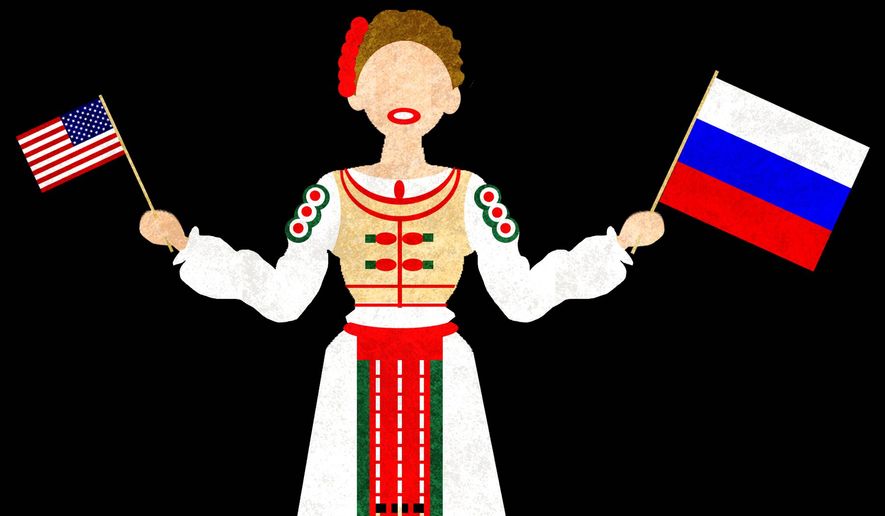OPINION:
Russia’s ever-increasing aggressiveness with its neighbors and the West’s occasional ambivalence about that interventionism have made life difficult for the countries caught in the crossfire. Some former Soviet states have taken a-now-familiar tack to deal with the dilemma; they play both sides and see how far they can get.
A prime example is the tiny but strategically important country of Moldova, whose Prime Minister Maia Sandu is expected to make her inaugural visit to the United States next week.
If anyone were to read recent history, Moldova would stand out as a strong candidate to be moving closer to the West. Its political leaders of the recent past, including former First Deputy of Parliament Vladimir Plahotniuc, fought for a more robust economic and political relationship with the European Union and the United States mindful of the opportunities for expanded trade that those relationships could bring. They have done this while being fully aware that the Russian takeover of Crimea in neighboring Ukraine might become a model for what happens down the road to them and Moldova. Indeed, Mr. Plahotniuc’s efforts appeared to earn him an intimidation campaign from Moscow replete with criminal investigations and death threats, forcing him to flee his country for his own safety.
Prime Minister Maia Sandu is similarly using rhetoric consistent with the recent past. She says she is seeking a more open, democratic government that can work with Western allies. Ms. Sandu often expresses a pro-European Union stance while also promising political, economic and anti-corruption reforms.
As a longtime member of the House Armed Services Committee, and someone who has visited Moldova, I have learned of such assertions. Her position isn’t shared by other officials in her government, particularly the arguably more powerful President Igor Dodon. Mr. Dodon, who was popularly elected, has made clear that he tilts more to the East and an alliance with the Kremlin.
It’s as if they are trying to have it every way with everyone — telling the West what it wants to hear via Ms. Sandu while Mr. Dodon plays directly to Russia.
So, who should we believe? Believe Mr. Dodon.
Mr. Dodon has been usurping power from his pro-Western prime minister. For example, he supports a constitutional amendment that would transition Moldova from a parliamentary system of government to a presidential republic. This is in keeping with Mr. Dodon’s plan to address the United Nations General Assembly this autumn, a duty usually reserved for the prime minister. Make no mistake, in Moldova power lies with the president — and that power these days in notably pro-Russia.
“For the last three years, we have held a blatant anti-Russian campaign,” Mr. Dodon told the Russian news outlet Tass last month. “Now the new government has to recover relations with all foreign partners.”
As part of that recovery of relations, Mr. Dodon has invested substantial time in the Russia relationship, making more than 30 visits — both personal and professional — since being elected.
He has further reassured Russia: “We are resuming the strategic partnership with the Russian Federation in all directions.” He bragged that Moldova received the first visit by a Russian minister of Defense in 28 years of independence, a visit that happened recently at his personal invitation.
So, it should be no surprise that it was reported that three days after Mr. Dodon was sworn in as president, the flag of the European Union that was hanging next to the Moldovan flag was removed from the presidential administration building. Mr. Dodon has taken this further and has sought to blame the European Union for his decision to move closer to Russia.
This support is apparently a two-way street. Russian President Vladimir Putin pledged his personal support for Mr. Dodon. In addition, Mr. Dodon’s Socialist Party is being investigated by the Moldovan general prosecutor’s office over whether the party has been receiving $1 million a month from Russia.
Other connections to Russia abound. Alexander Dodon, the president’s brother, is reportedly a business partner with Igor Czajka, son of Russian Prosecutor General Yuri Czajka. They reportedly own a lucrative company that collects and disposes of garbage in Russia.
Meanwhile, Moldova’s prime minister continues to court the West, hoping the United States and the EU won’t notice the president pulling the levers behind the curtain and moving in the other direction.
Western governments need to pay attention and realize that the words, deeds and policies coming from a Moldovan president who is only growing in power are tangible warnings of a shift toward Russia by Moldova. It is another nominally independent government that could fall into Moscow’s hands.
• Bill Shuster is a former Republican member of the House who served on the House Armed Services Committee.




Please read our comment policy before commenting.